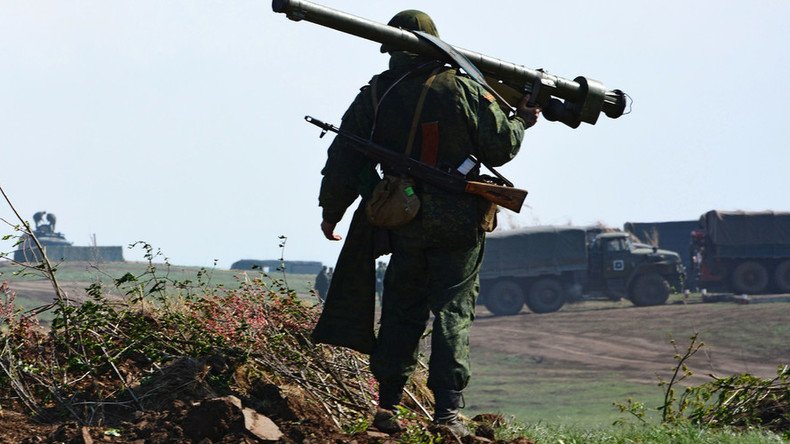FSB accuses Ukrainian special services of using OSCE mission as spy cover in Donbass

Ukrainian special services are using international groups like the OSCE as cover for intelligence gathering operations and sabotage in the self-proclaimed Lugansk republic, the FSB reported, referring to the testimony of a detained Ukrainian agent.
“The testimony and documents received by the FSB counter-intelligence from [Ukrainian citizen] Shestakov unambiguously demonstrate that Ukrainian special services illegally use the OSCE mission in the Lugansk People’s Republic to collect military data and organize acts of sabotage,” the Federal Security Service’s Center for Public Communications reported on Monday.
“The disclosed facts prove that the Ukrainian special services ignore international law,” the message read.
READ MORE: Direct dialogue, amnesty & free elections is key to Ukraine settlement – Lavrov
Shortly beforehand, the FSB reported that Artyom Shestakov – an interpreter working for the Special Monitoring Mission for Ukraine of the Organization of Security and Cooperation in Europe – had been detained on Russian territory and uncovered as an agent of the Ukrainian Security Service, the SBU. Shestakov confessed that in the summer of 2015 he traveled to Kiev and was recruited to work as an agent for SBU when he was already working for the OSCE mission. The man disclosed his alias as Svarog (the name of one of Slavic pagan gods) and said the name of his handler as Sergey Slipchenko from the Directorate for Protection of National Statehood.
Russian counter-intelligence officers said that Shestakov gathered information about the political economic and military situation in the republic and transferred it to the SBU. In particular, he gave Kiev the coordinates of Lugansk’s militia units, the cellular phone numbers of their commanders, and data about the movements of troops and combat vehicles.
The conflict in eastern Ukraine, which many now describe as a civil war, began in April of 2014, when the freshly installed nationalist regime in Kiev sent military forces and neo-Nazi “volunteer units” to the country’s southeastern regions of Donetsk and Lugansk, which refused to recognize the coup-imposed government in the capital.
According to UN estimates, over 9,000 people have died in two years of constant fighting, many of them civilians, including women and children. In February of 2015, the warring sides managed to secure a peace deal through the mediation of Russia, Germany, and France. However, the conflict is still far from settled.
In late May, Russia and Ukraine conducted a prisoner exchange in which a Ukrainian military officer named Nadezhda Savchenko was swapped for Yevgeny Yerofeyev and Aleksandr Aleksandrov, who are both Russian citizens. Savchenko was serving a prison term in Russia after being convicted of complicity in killing two Russian reporters who were covering the military conflict in Donbass, as well as of illegally crossing the Russian border. The two Russians had been jailed in Ukraine for “terrorist activities” – a term used by the court in Kiev to describe the fight of the self-proclaimed republics of Donetsk and Lugansk for more autonomy. Both of them had pleaded not guilty.
READ MORE: Russia/Ukraine Savchenko prisoner swap deal
In mid-June, Russia and Ukraine conducted another prisoner swap in which Ukrainian citizens Yury Soloshenko and Gennady Afanasyev, who had been detained on terrorism and espionage charges in Russia, were exchanged for Vitaly Didenko and Elena Gluschinskaya – Ukrainian journalists sentenced to prison by the Kiev regime on charges of separatism.
On June 15, Russian presidential press secretary Dmitry Peskov told reporters that he did not exclude the possibility of more prisoner exchanges between Kiev and Moscow.












